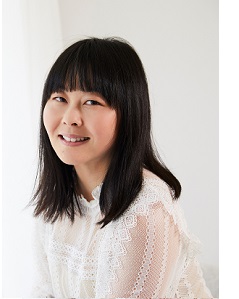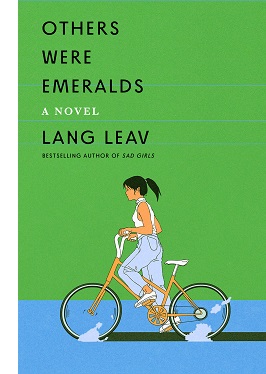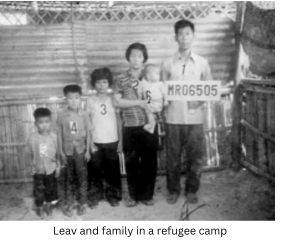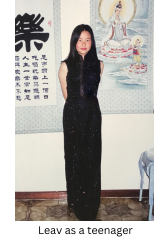
 In
Others
Were Emeralds, author and poet Lang Leav draws on her
own childhood experiences to tell the story of Ai, the daughter of
Cambodian refugees, who fled the Khmer Rouge for Australia, only to
face new challenges when they arrived. Like Ai, Leav grew up in an
Asian suburb of Sydney and encountered overt racism and violence as
part of the largest wave of Asian immigrants to Australia in the 80s
and mid-90s.
In
Others
Were Emeralds, author and poet Lang Leav draws on her
own childhood experiences to tell the story of Ai, the daughter of
Cambodian refugees, who fled the Khmer Rouge for Australia, only to
face new challenges when they arrived. Like Ai, Leav grew up in an
Asian suburb of Sydney and encountered overt racism and violence as
part of the largest wave of Asian immigrants to Australia in the 80s
and mid-90s.
The coming-of-age novel focuses on Ai’s complex relationships with a tight-knit group of friends--who have their own harrowing stories to tell--as they navigate normal teenage problems and struggle to find their place in a new, unwelcoming world. Leav, who was born in a Thai refugee camp, says she wrote Others Were Emeralds because she missed home, and it was the first time she’d written about her past in such an intimate way.
"Writing it was a magical experience,”
says Leav, who now lives in New Zealand. “I loved the time I spent
in that world, even though it was often painful to relive some of
the memories.” We spoke with Leav about why she wrote such a
personal novel, how being called an “outsider” affected her
self-esteem, and if she finally feels like she belongs.
 Both you and Ai are the daughters
of Cambodian refugees. What was it like growing up in the Asian
suburb of Cabramatta, and how much of the book was based on
real-life experience?
Both you and Ai are the daughters
of Cambodian refugees. What was it like growing up in the Asian
suburb of Cabramatta, and how much of the book was based on
real-life experience?
I drew from my own life, especially my mother's stories. Growing up
in Cabramatta was a unique experience, and when I share my stories
with people outside the area, they are often shocked. Despite the
challenges in our community, I have a deep affection for the place
and wouldn't want to have grown up anywhere else.
Why did you create the fictional town of Whitlam instead of just
calling it Cabramatta?
Initially, I named it Cabramatta, but I found that it was too
distracting. Cabramatta holds deeply personal connotations for me,
which only those who grew up there can truly understand. I wanted to
focus on the narrative without the baggage of that name, so I chose
Whitlam, the name of our local library, where I spent much of my
time.
The friendship between Ai and Brigitte is deep and
complicated. Did you have a friend like Brigitte growing up?
I adore the friendship between Ai and Brigitte. My characters are a
blend of people I've loved and facets of my own self. I've been
fortunate to grow up with wonderful friends, some of whom remain in
my life today.
 The friends in the book talk about the experiences
of their parents fleeing war-torn countries. Have you talked to your
parents about their trauma fleeing Cambodia? I can only imagine how
difficult it must have been for them.
The friends in the book talk about the experiences
of their parents fleeing war-torn countries. Have you talked to your
parents about their trauma fleeing Cambodia? I can only imagine how
difficult it must have been for them.
I would love to have a complex and nuanced conversation with my
parents, but the language barrier makes it challenging. While I
don't fully understand their feelings on a deeper level, I know they
did their best with the cards they were dealt. They worked hard and
passed on their work ethic to my brothers and me.
You wrote the book during the COVID lockdown. Did events in
the news inspire you to write about racism and the Asian immigrant
experience?
The disturbing rise in attacks against Asians during COVID certainly
impacted me. Although I didn't experience personal attacks due to
staying at home, it did evoke painful memories. Additionally, the
pandemic made me nostalgic for my youth in Cabramatta and brought
forth many memories as I crossed into my 40s. Writing about my
immigrant experience was something I'd always wanted to do, but it
was important to tackle it when I felt truly prepared.
Racism against Asians was particularly bad when you were a
teenager in Australia. What impact did it have on you?
Racism leaves deep and lasting impacts. It has certainly affected my
self-esteem, a struggle I continue to face, though it has improved
with age. You were told "this isn't your country" a lot while
growing up.
 Do you
finally feel like you "belong"and was the novel cathartic to
write?
Do you
finally feel like you "belong"and was the novel cathartic to
write?
Yes, writing the book was cathartic. The question of belonging is
complex, and I'm not sure I have a definitive answer. I do feel a
sense of belonging in certain places, like my mother's garden, my
first year at college, and my first apartment. Whether that extends
to Australia as a whole is less certain, but it's connected to the
fragments of my life.
Have attitudes toward Asians in Australia improved much since
then?
I haven't lived in Australia for the past
14 years, so I can't provide an up-to-date assessment. However, I've
noticed Asian-Australians holding positions of power in politics,
sports and the media, which fills me with pride.
You’re an award-winning poet, and you have two YA novels
under your belt. How different is the creative process when you're
writing poetry, YA, or adult novels?
Each genre presents its unique challenges. When it comes to poetry,
you're often reliant on that sudden burst of inspiration. In
contrast, writing fiction feels more self-driven because you can
draw from the world around you and your day-to-day experiences.
Poetry tends to be less tangible, whereas fiction demands great
attention and focus. Both have their difficulties, but they manifest
differently.
Are you planning a follow-up novel, maybe about Ai's mother?
At the moment, there are no plans to write a book specifically about
Ai's mother. I'm currently working on my next novel, set in the late
2000s, which charts the rise of social media.